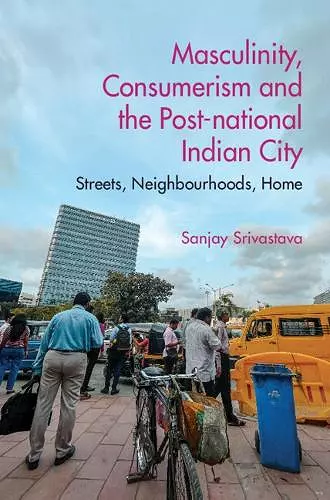Masculinity, Consumerism and the Post-National Indian City
Streets, Neighbourhoods, Home
Format:Hardback
Publisher:Cambridge University Press
Published:5th Jan '23
Should be back in stock very soon

Masculine cultures define urban cultures and are defined by them. A multidisciplinary analysis that explores urbanism, masculine anxieties and gender relations.
Of relevance to researchers, graduate students and a lay readership interested in urban life, masculinity, power relations between genders, changing meanings of 'family', 'home', 'tradition', consumer cultures, and the phenomenon of the 'masculine' political leader. An interdisciplinary study of the local and the global in Indian life.Imagining the city as a series of interconnected spaces, the book explores how several such connections – between the home and the street, family and public spaces, religious and non-religious contexts, for example – relate to the topic of masculinity. How do men – elite, subaltern, consumers, 'heads' of the family, members of 'Hindu fundamentalist' organisations, readers of pulp fiction and 'footpath pornography', those who admire the 'strong' political leader – move between these spaces, define them and are defined by them? Urbanisation in India is a vibrant site of an extraordinary cultural, social and economic churn, a context of both the consolidation of masculine identities as well as anxieties regarding their place in the city. The book suggests that sustained and in-depth engagements with specific historical and social contexts avoids tendencies to imagine cities as nodes of comparison that frequently generates universal models of urbanism.
'In Masculinity, Consumerism, and the Post-national Indian City Sanjay the author provides a critically incisive and deeply perceptive analysis of contemporary India's complex urban landscape and the way in which cultural formations of gender, sexuality, and nationalism shape and are shaped by this landscape. As one of the most insightful and rigorously critical sociologists studying India today, Srivastava provides an exceptionally powerful, multi-dimensional analysis of how embodied values, anxieties and contradictions are manifest in the city and how power relations animate post-national masculinity. One of the great strengths of this book is its powerful synthesis of perspectives on gender, politics and rapid urban expansion ranging from formal governance, party politics and economic policy to practices of consumption and everyday life on the streets.' Joseph Alter, University of Pittsburgh
'This book offers readers new ways of thinking about urbanism, gender and the nation. It is not often that the field of masculinity studies extends itself in so many socially relevant and productive ways.' Mary E. John, Centre for Women's Development Studies, New Delhi
'Reflecting his long-term engagement with India's metropolitan modernities, Srivastava's monograph explores from multiple-and at times, unexpected-perspectives the making and re-making of masculine subjectivities in the context of the fast-changing urban environment of New Delhi and its sprawling peripheries. Here, the materiality of urban spaces is both a stage upon which masculinities are evoked and performed, and the 'structuring structure' for their unfolding. On the strength of fascinating ethnographic case studies and vignettes, the author introduces novel analytics-expressed by the notions of post-national condition and moral consumption-to capture the emergence of political subjectivities, economic practices and aesthetics which have undergirded the rise of aggressive Hindutva politics within different urban social bodies, as well as the (re)gendering and (re)caste-ing of (private and public) urban spaces, often leading to violent assertions of (upper-caste/middle-class) masculinities. This book makes compelling reading and sets an exciting new agenda for understanding contemporary Indian urbanism.' Filippo Osella, University of Sussex
ISBN: 9781009179867
Dimensions: 236mm x 161mm x 18mm
Weight: 410g
210 pages